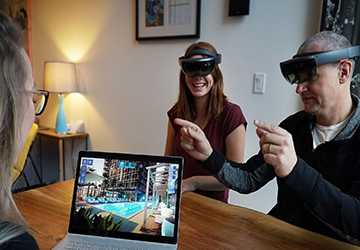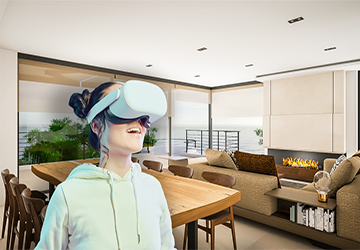The evolution of technology has led to many groundbreaking developments in various industries. One of the most notable advancements is the integration of Virtual Reality (VR) in diverse fields. Particularly in the realm of real estate, the potential of VR is unlocking new horizons. Virtual reality marketing is fast becoming the game changer for realtors looking to provide their clients with immersive experiences. Let’s delve into how one can harness tech in real estate through VR and why VR property tours are the future.
1.Virtual Reality Marketing: Beyond Traditional Methods
The traditional real estate marketing tools, like physical brochures and 2D photos, can't quite capture the essence of a property in its entirety. However, virtual reality marketing transcends this limitation. Potential buyers or renters can immerse themselves in the property and experience the space, layout, and ambiance in a way that photographs just can’t match. This not only makes the property more appealing but also gives the marketer a competitive edge in the saturated real estate market.

2. Efficiency and Convenience with Tech in Real Estate
Using tech in real estate provides efficiency and convenience. VR property tours mean potential buyers don’t need to physically visit every property they're interested in. Instead, they can explore multiple properties from the comfort of their own home. This is particularly useful for those looking at international properties or those who simply lack the time for multiple physical viewings.
3.VR Property Walkthroughs: A Personalized Experience
A VR property tour isn’t just a generic walkthrough. Advanced VR software allows for customization. Buyers can change wall colors, move furniture around, or visualize how their own belongings would look in the space. This personal touch makes it easier for potential buyers to connect with a property and envision it as their future home.
4.Overcoming Distances
One of the challenges in real estate marketing is catering to international or out-of-town clients. Virtual reality marketing eliminates geographical barriers. A client in Tokyo can take a virtual tour of a property in New York without boarding a flight. This global reach gives realtors a broader clientele base, which was previously restricted by geography.
5.Reducing Costs with Tech in Real Estate
While the initial investment in VR technology might seem significant, it reduces several other costs in the long run. Think about the expenses associated with organizing open houses, printed brochures, or transporting clients to various properties. Tech in real estate, especially VR, significantly cuts down these costs, offering a better ROI over time.
6.Building Trust Through Transparency
One of the criticisms often directed at property photographs is that they can sometimes be misleading. With a VR property tour, what you see is what you get. This transparency can greatly enhance trust between the realtor and potential buyers, as clients feel they're getting an authentic view of the property.

7.Enhancing Customer Engagement with Virtual Reality
The use of virtual reality marketing does not just end at providing a 3D tour. It offers an interactive experience that can be tailored to suit each client's unique preferences.
Feedback Loops: Realtors can incorporate feedback mechanisms within the VR experience. As clients explore properties, they can indicate areas they like or dislike, offering realtors valuable insights into their preferences.
Live Interaction: Tech in real estate has the potential to integrate live chat or video features. While a client is touring a VR property, they can ask questions in real-time, getting immediate responses from the realtor.
8.Sustainable Real Estate Viewing
Virtual tours significantly reduce the need for physical property visits. This has a more profound effect than one might think.
Environmental Impact: Fewer physical visits mean less vehicular movement. In a world that's becoming increasingly conscious of carbon footprints, VR contributes to a greener and more sustainable real estate industry.
Safety and Health: Especially in times where health and safety are of paramount concern, virtual tours reduce the risk of transmitting illnesses, offering a safer alternative to traditional property viewings.
9.Making Pre-construction Properties Tangible
One of the challenges realtors face is marketing properties that are yet to be constructed. With tech in real estate, specifically VR, this challenge is mitigated.
VR Mockups: Potential buyers can walk through properties that don’t yet exist in the physical realm, thanks to detailed VR mockups. This makes it easier to market and sell properties in the pre-construction phase.
10.Customization at Its Best
We've touched on how VR property tours can be customized, but the depth of this customization deserves its own spotlight.
Day and Night Views: Clients can view the property at different times of the day, understanding the play of natural light or seeing the ambiance of the surroundings at night.
Seasonal Changes: Some advanced VR systems allow for the representation of properties across different seasons, letting clients envision a snowy winter day or a bright summer afternoon.
11.An Invaluable Tool for Realtors
● For realtors, virtual reality marketing is more than just a fancy tool—it’s an essential asset in their marketing toolkit.
● Training: New realtors can be trained using VR, acquainting them with properties without needing to visit each one in person.
● Presentation: Realtors can showcase multiple properties to clients in a single sitting, making the sales process more efficient.
Future Integration Possibilities
As tech in real estate continues to advance, we can expect even more integrations. For instance, combining VR with augmented reality (AR) could allow clients to get information on local amenities, schools, or public transport options as they take their virtual tours. The possibilities are boundless.
Conclusion:
As the world becomes more tech-savvy, industries must adapt to remain competitive. Real estate is no exception. The landscape of real estate marketing is evolving at an unprecedented rate, with virtual reality marketing leading the charge. Leveraging virtual reality marketing not only places realtors at the forefront of technological advancements but also offers genuine value to clients. As we transition into a more digitalized age, VR property tours and other tech integrations will become not just desirable but essential in real estate marketing.


